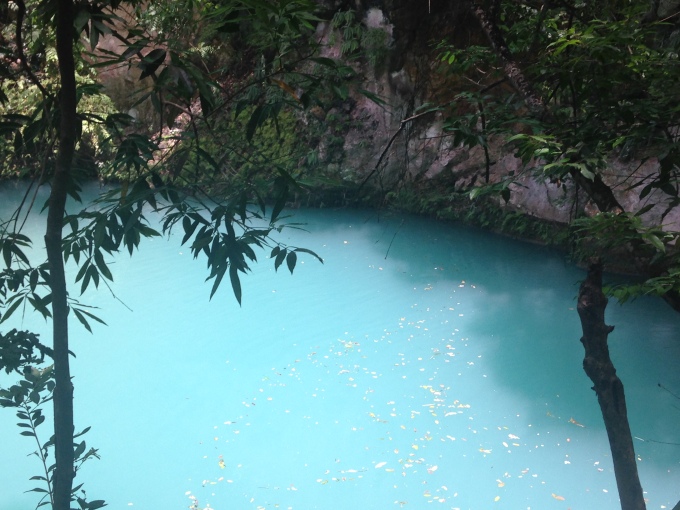I've been trying to write with more frequency, not caring about fluidity right now, but mainly getting ideas down. I don't want anything to hold back the getting thoughts down, because ultimately I will return to reference, edit and rewrite. I am also collecting my experiences and as each day passes we have more to add. Novelist Chimamanda Adichie has a talk entitled , The Danger of a Single Story in which she eloquently talks about how having only one narrative of a people or subject can prevent people from seeing how multidimensional and complex life is, how many different realities can exist. I've been feeling that about my experiences as a woman of color and the images portrayed by media of Haiti.
 Haiti is more than just piles of rubble and poverty. Lagoons like this one at Bassin Bleu exist too. Photo Credit: Dominique Bouillon, August 2015
Haiti is more than just piles of rubble and poverty. Lagoons like this one at Bassin Bleu exist too. Photo Credit: Dominique Bouillon, August 2015
Adichie talks about how growing up in Nigeria she was first introduced to books that only contained foreigners and therefore as a child she thought that books could only be about subjects that she could not personally identify with. It wasn't until she was introduced to books by other Nigerians like Chinua Achebe that she realized that people who look like her could be the characters in books.
I personally have experienced the "danger of a single narrative" in various forms but as a woman of color and as a Haitian American mostly. Most of the Americans I've encountered don't know much about Haitian history or culture. Many of them are surprised if you are of Haitian descent and you don't fit into their neat package of what they expect you to look and act like. Even progressive, conscious friends have implied that I must bleach my skin since my complexion is on the light side of the color spectrum. As if being Haitian could only mean you can come in one color and look a certain way. Anyone who reads history or knows human nature will know that Haitians can be as mixed and as varied (and are) as people in any other part of the world. I have had white people in the justice movements label me a race/cultural background without asking me or clarifying with me first.
People of color who are in the Americas - many of us are racially and culturally mixed. I say this because we are constantly lumped into one category. Unfortunately we don't have as easy a time knowing our complete backgrounds because of slavery and privileges we were denied throughout history; records weren't kept. One of the things I'm trying to do for future generations (my niece and nephews and my future children and other people in general) is to rewrite the narrative of my family or as much of it as I can find. I didn't grow up with everything at my fingertips so I've had to go back researching. My trips to Haiti have given me a chance to see the places in which my parents were born and grew up and it makes me happy to know that they saw majestic mountains every day of their lives when they were in Haiti. It fills me with a satisfaction they they grew up with fruit trees all around them and folklore and culture and their own languages.
Many times the images we see of Haiti are the tent camps after the earthquake, hungry naked kids, poor people. It's time to start showing more of the schools, the libraries, the beautiful homes, the mountains and sea. It's time to hear more of the fascinating folklore . It's time to start putting on the map all the skill and talent that are from Haiti. During my upcoming trips to Haiti this summer and in January, I plan to continue to add to the documentation of all the other narratives of Haiti.
My sister recently did a DNA check on our family - a swab from her cheek to see that what exactly is in our blood. I will write further on that another time.